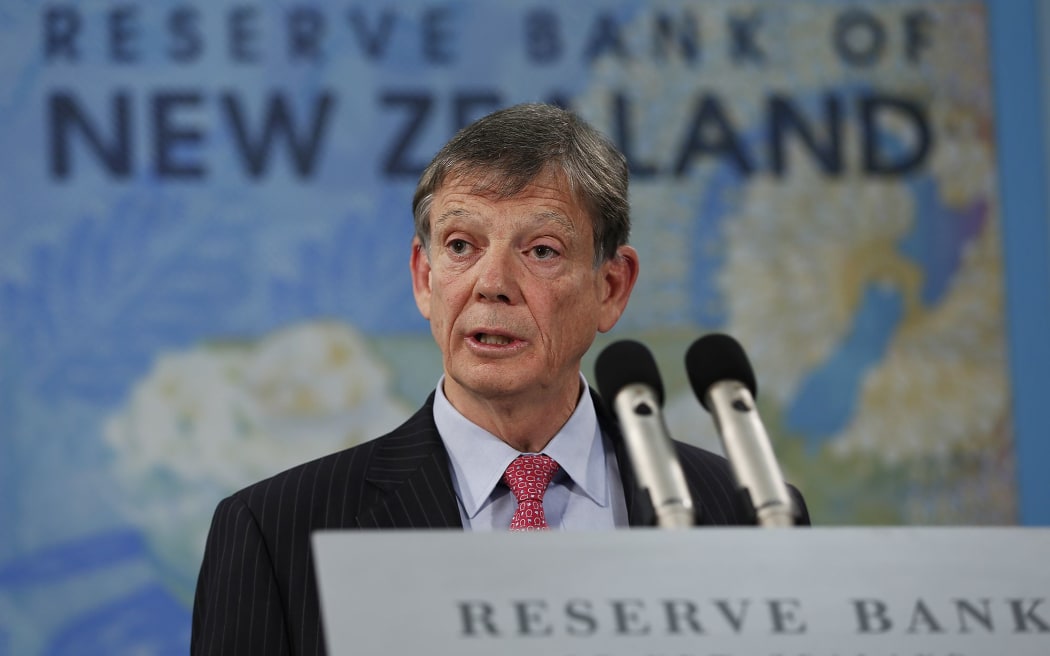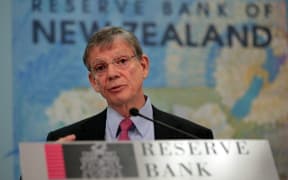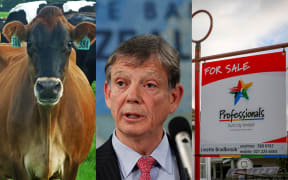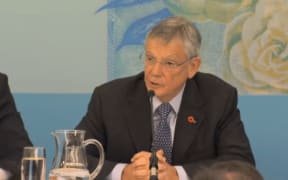The Reserve Bank cut the Official Cash Rate (OCR) four times last year, from 3.5 percent to where it finished 2015 at 2.5 percent.

Reserve Bank governor Graeme Wheeler. Photo: RNZ / Diego Opatowski
Tomorrow it releases its first detailed look at the economy this year, complete with economic and financial market forecasts, and the question is, as always, will it cut the OCR or keep it on hold at 2.5 percent.
Governor Graeme Wheeler sounded a most reluctant rate cutter in his set piece speech early last month, but since then there have been weaker dairy prices, receding inflation expectations, higher overseas funding costs for banks, a stubbornly high New Zealand dollar and a slowing world economy.
On the other hand, the economy is still notching respectable growth, unemployment is low and the housing market is bubbling along.
Opinion is mixed among the economists, with a solid number picking one or two rate cuts later in the year, and another camp which says no action is needed unless the global situation turns to custard.
Zoe Wallis
Kiwibank senior economist Zoe Wallis is the only analyst of seven RNZ spoke to who is picking a quarter percentage point rate cut this week to 2.25 percent.
She said the Reserve Bank should just do it.
"I think the downside risk has turned into more a central scenario than the RBNZ was probably anticipating even six weeks ago given weak inflation, and a weak global growth environment and question marks perhaps over the sustainability of local growth.
"I'm not saying the economy is tanking. By no means is that happening. There is still several bright spots, tourism being one of them."
"And I think the wisest path is to cut now in order to avoid regrets later on down the track."
Nathan Penny
But ASB Bank rural economist Nathan Penny said low inflation expectations were likely to persist, and he expected the central bank would cut the cash rate in two steps in June and August. However, he believed there was an outside chance of a cut this week.
"We think that's probably a bridge too far for the RBNZ and while we wouldn't rule it out, they will change their tune a little and move towards a stronger easing bias.
"So, that does open up the possibility of an April move."
Michael Gordon
Westpac Bank senior economist Michael Gordon was also forecasting rate cuts in June and August, with the RBNZ expected to provide more clarity to the market on its intentions.
"A lot of this comes down to tactics. Look at some of their [RBNZ] recent speeches. They recognise that there is scope for rates to go lower, but there are lingering concerns around things like the housing market, for instance," he said.
"The Auckland housing market has slowed quite a bit since these new sets of regulations. It's not clear whether it's an initial adjustment or whether it's going to be something more lingering.
"So I think the RBNZ will be wary of the risk that they could lower interest rates and find that the Auckland housing market takes off on them again."
Paul Bloxham
HSBC chief economist in Australia Paul Bloxham said it was important for RBNZ Governor Graeme Wheeler to reinforce his message and clearly signal an easing bias.
"Making a statement can be helpful, and that is what we refer to as central bank jawboning. But if it's not followed up by some sort of action, [then] the market doesn't believe it for a particularly long period of time," he said.
"The main thing the RBNZ will be keeping in mind is, if it doesn't bolster its rhetoric about further expectations of cutting, then potentially it might put some upward pressure on the New Zealand dollar, which would be unhelpful for the inflation story."
Darren Gibbs
Deutsche Bank chief economist Darren Gibbs said he was more optimistic, and there was a chance the Reserve Bank might want to take a wait and see approach through the rest of the year.
"I'm probably a little more optimistic than most. I think some of the volatility we've seen in markets is a little bit exaggerated. We have seen a pickup in market sentiment over the last two or three weeks, and I'm hopeful that will continue."
"So my base case is that we'll manage to get through this year at 2.5 percent."
Stephen Toplis
BNZ head of research Stephen Toplis said he expected the RBNZ to talk dovishly about further easing, but said that was not what was needed.
"[At) this sort of juncture we should do a cost-benefit analysis on interest rates movements. And that is saying 'yeah, the inflation numbers suggest we should be cutting rates but what's the damage that we could do to the broader financial stability of the economy in the advent that we did that?'.
"And our perspective is that, given our single largest concern at the moment is an overvalued housing market, that the costs of lowering interest rates are just far too great."
Cameron Bagrie
The final word goes to ANZ Bank chief economist Cameron Bagrie, who said dark clouds, such as the rising cost of funds, were looming but there was no reason to panic.
"The message [from the RBNZ] will be pretty simple - we stand ready to act if required. I think that message will come through loud and clear. They opened the door ajar to a rate cut in January. I suspect they'll probably nudge it open a little bit further in March, but stop short of full validation, saying rates are going down."





